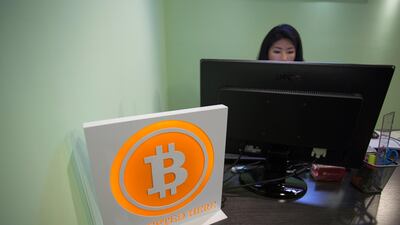Since I wrote about the “bitcoin bubble” last week, the crypto-currency, or “digital gold” as it is now referred to, has attracted almost as much attention from commentators and central bankers as Brexit.
On Thursday, bitcoin rose 15 per cent to a new high of US$11,395, before falling to $9,000 a few hours later. It began this week with another boomlet, this time hitting $11,800 (briefly) on the Asian markets, an increase of 12-fold in a year, before dropping back again. That’s a scary level of volatility, which prompted a new battery of warnings from serious-minded regulators, but also flushed out an impressive array of supporters who have presented some sensible and cogent reasons why it should go even higher. And for making us sceptics think again.
I might think it is a bubble ready to burst, as I argued last week, and so might a wide circle of central bankers, economists and commentators. Yet there are plenty of sober-minded analysts who have delved deeper into the bitcoin phenomenon than any of us and who are not surprised at all by its strength and resilience - and believe it can go even higher. My argument, I fully acknowledge, relies heavily on long experience of past bubbles and the conviction that no market for any commodity, from shares to minerals, wine, art or property, has ever risen in a straight line and every boom is followed by a bust. Even bitcoin can’t defy gravity forever, and the old stock market rule that the faster the rise, the bigger the fall still holds true. A rise of over 1,000 per cent in a year in any decent-sized market - and there is now over $350 billion worth of bitcoins in circulation - is unprecedented.
I am far from alone in holding that view. Sir Jon Cunliffe, the deputy governor of the Bank of England, solemnly warned last week that no central bank stood behind bitcoin and in his view “investors need to do their homework” – which meant take care. The president of the New York Federal Reserve, William Dudley, echoed his view. “I would be pretty cautionary about it. I think that it’s not a stable store of value,” he said at an event in New Jersey. “I would be, at this point, pretty sceptical of bitcoin.”
The Chicago Mercantile Exchange and Chicago Board Options Exchange are on the point of launching futures markets in bitcoins within weeks, making it easier for traders to take profits or cover losses. Concerned at losing out in a rapidly growing market, Nasdaq also announced plans to launch bitcoin futures contracts next year, a major recognition than the market is here to stay and should be taken seriously.
Even the big banks, who had previously dismissed the cryptocurrency market with contempt, are having second thoughts. This week the respected JP Morgan analyst Nikolaos Panigirzoglou ventured the view that bitcoin could soon join gold as a reliable, long-term way to store wealth and develop into a traditional asset class.
_______________
Read more:
Bitcoin Now Bigger Than Buffett, Boeing and New Zealand Economy
Venezuela to create a virtual currency backed by oil and gas reserves
Bitcoin heads to Wall Street to trade futures on exchanges
_______________
Mr Panigirzoglou’s support is perhaps the most significant intellectual boost for bitcoin so far, particularly as his own chairman, Jamie Dimon - probably the single most powerful banker in the world today - famously warned in 2015 that it was “a fraud” which would “blow up” just as the tulip bulb market did in the 17th century. Anyone at JP Morgan discovered dealing in bitcoins, he added, would be summarily fired. As a matter of record, the price of a Bitcoin then was $350, so there may be a few dealers inside the bank who would have preferred getting the sack.
Mr Dimon, who presumably approved the release of Mr Panigirzoglou’s research, is not alone in changing his mind. His big rival, Goldman Sachs’ chief executive Lloyd Blankfein, is having second thoughts, too. “It’s not for me,” he said when he was asked about bitcoin, “but there’s a lot of things that weren’t for me in the past that worked out very well. I’m not guessing that it will work out … because it might.” That sounds pretty much like an endorsement to me.
Mr Panigirzoglou’s analysis is a fascinating one. He now estimates that since it started in 2009 only a net $6bn has been invested in cryptocurrencies – not just bitcoin but its competitor, Ethereum, as well – which is not an enormous amount compared to gold where the total value of all the world’s bullion outside the vaults of central banks is $1.5 trillion.
His point, however, is that trading volumes for bitcoin hit $140bn last month and Ethereum did another $30bn. Gold plodded along at $900 million a month, which is where it has been for decades. You don’t have to be a genius to see where that’s going. Bitcoin is the new disruptive currency and poor old gold, after three millennia as the go-to store of value in a financial storm, is about to be eclipsed.
In the increasingly heated debate between the bulls and the bears last week, there was a bizarre intervention from an unexpected direction, one might even say from “left field”. Venezuela’s president Maduro announced that he, too, is launching his own cryptocurrency, grandly called the “petro”, which he openly admits is designed to dodge US sanctions on its proper currency. It will be backed by Venezuela’s dwindling oil reserves, which is odd, as the whole point of a cryptocurrency is that it is not backed by a government at all. It is not clear that Mr Maduro realises this yet. “The 21st century has arrived!” he exulted.
He is right of course – but it won’t be in Venezuela.

